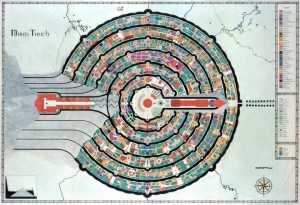Science Seen Physicist and Time One author Colin Gillespie helps you understand your world.
Debt Stream
It is, or should be, of concern to every author to acknowledge other people’s contributions to their work. In my writing I try to extend such recognition not only to those I quote but also to those who in some manner influence my thoughts. It seems to me this gives the reader better insight into links between ideas. But my acts fall short of my intent.
One such shortfall is my having until now said nought of my great-uncle, Brian Hone. Uncle Brian—later Sir Brian—loomed large in my teens. Years attending the storied school of which he was  headmaster. Weeks spent at his and Aunt Enid’s cottage by the beach. Hours in his music class, thirty of us crammed into his living room with Mozart’s 40th—Royal Philharmonic and Sir Thomas Beecham—each week. Later, days of work on his custom hi-fi: Ortofon pickup tracking at one gram, low-noise pre-amps. And, in every circumstance, his moral presence. As Aussie biographer Weston Bate says: ‘His humanity was palpable, there was so much of him.’ He left a deep impression; yet now, try as I might, I cannot piece his words together. What then can I say of my ideaistic debt to him?
headmaster. Weeks spent at his and Aunt Enid’s cottage by the beach. Hours in his music class, thirty of us crammed into his living room with Mozart’s 40th—Royal Philharmonic and Sir Thomas Beecham—each week. Later, days of work on his custom hi-fi: Ortofon pickup tracking at one gram, low-noise pre-amps. And, in every circumstance, his moral presence. As Aussie biographer Weston Bate says: ‘His humanity was palpable, there was so much of him.’ He left a deep impression; yet now, try as I might, I cannot piece his words together. What then can I say of my ideaistic debt to him?
Only latterly I learned of how he came to be close to C.S. Lewis, his tutor at Oxford from 1930 to ’32. And later yet I learned of Lewis’s alliance with his colleague J.R.R. Tolkien. They shared an interest in writing mythic tales to convey moral messages. They made a pact to write of time and space. British writer Colin Duriez says they split it with a coin toss. Tolkien took time, leaving space for Lewis.
Lewis is best known for books on Narnia. His tryst with space includes his favorite, Perelandra, a morality play, part of his Space Trilogy. His hero, Ransom, is, like Tolkien, a philologist. His fantastic scenes barely extend beyond our Solar System—much the same reach as real space exploration has today.
 Tolkien did not write overtly of time; but time threads through his works. For example he repeats (though not given to such repetition) a passage that includes the phrase, “Here at the end of all things.” A master of language, he leaves it to readers to clothe this end with his intended meaning. Clearly it’s a time-like not a geographic one. He means, too, an end that’s universal, not just personal. In the same book he portrays a temporary end of time:
Tolkien did not write overtly of time; but time threads through his works. For example he repeats (though not given to such repetition) a passage that includes the phrase, “Here at the end of all things.” A master of language, he leaves it to readers to clothe this end with his intended meaning. Clearly it’s a time-like not a geographic one. He means, too, an end that’s universal, not just personal. In the same book he portrays a temporary end of time:
… the wind died, and the light failed, and the Sun was bleared, and all sounds in the City or in the lands about were hushed: neither wind, nor voice, nor bird-call, nor rustle of leaf, nor their own breath could be heard; the very beating of their hearts was stilled. Time halted.
Now, finding I am writing about space and time and what science says of what they are and why they are the way they are, I ask: What unacknowledged debt stream might flow through my uncle and his mentor Lewis and Lewis’s friend? Rereading Tolkien’s words, I recall writing about what time is and the (unphysical) idea of its stopping only to go on again. I wrote:
… everything would stop. Well, not exactly stop. Just would not go on until it went. Including everything we might think marks the Tocking or the stopping of the Cosmic Clock. In some non-existent way, Buddy’s watch, birds, rivers, moons, thoughts, light and instruments would falter. His watch would not even not tick. The birds would neither fly nor fall. The rivers would not run but would not stand unrunning.
I even mention Tolkien in that very chapter, in a different connection.
What debts do I owe? I do not know. But is this not the way ideas flow?
Sources:
Weston Bate (1996), “Hone, Sir Brian William (1907-1978)”, Australian Dictionary of Biography, Canberra: Australian National University, vol. 14; http://adb.anu.edu.au/biography/hone-sir-brian-william-10532
Colin Duriez (2003), Tolkien and C.S. Lewis: The Gift of a Friendship, Mahwah NJ: Paulist Press; https://www.goodreads.com/book/show/7344.Tolkien_and_C_S_Lewis
J.R.R Tolkien (1955), The Return of the King, London: George Allen & Unwin, pp. 1240, 1244 & 1260 in the 2007 HarperCollins paperback edition; http://tolkiengateway.net/wiki/The_Steward_and_the_King
Colin Gillespie (2013), Time One: Discover How the Universe Began, New York: RosettaBooks, p. 289, http://www.rosettabooks.com/book/time-one/; “The Cosmic Clock”, http://www.timeone.ca/chapters/the-cosmic-clock.pdf
Image credits:
Colin Dimech, http://www.panoramio.com/photo/773337
J.R.R. Tolkien, http://i.imgur.com/CyYEYCZ.jpg

An interesting story of how family can influence and inspire,touching and true.Noted a new word,”idealistic” which I will explore,thanks for this